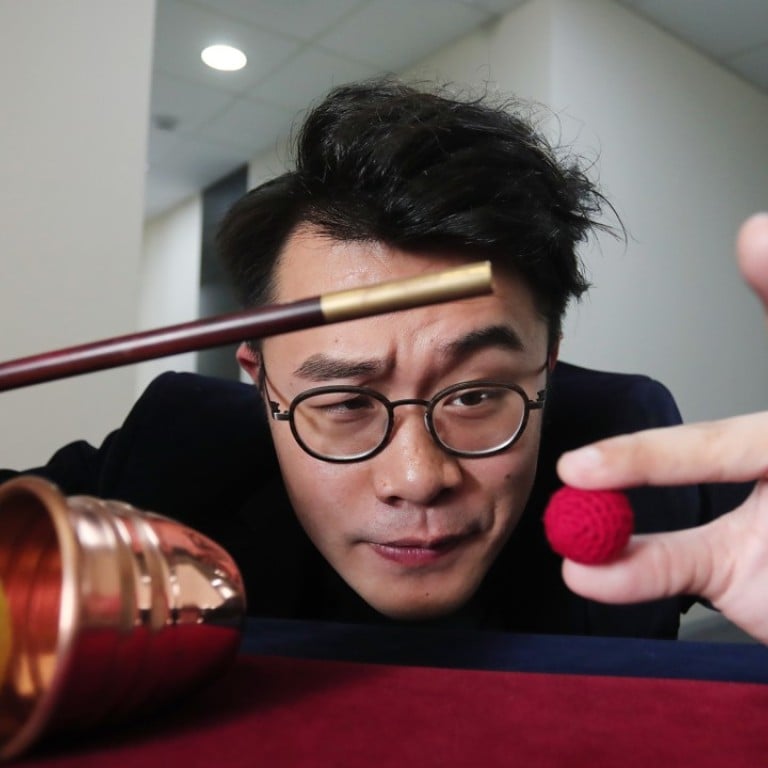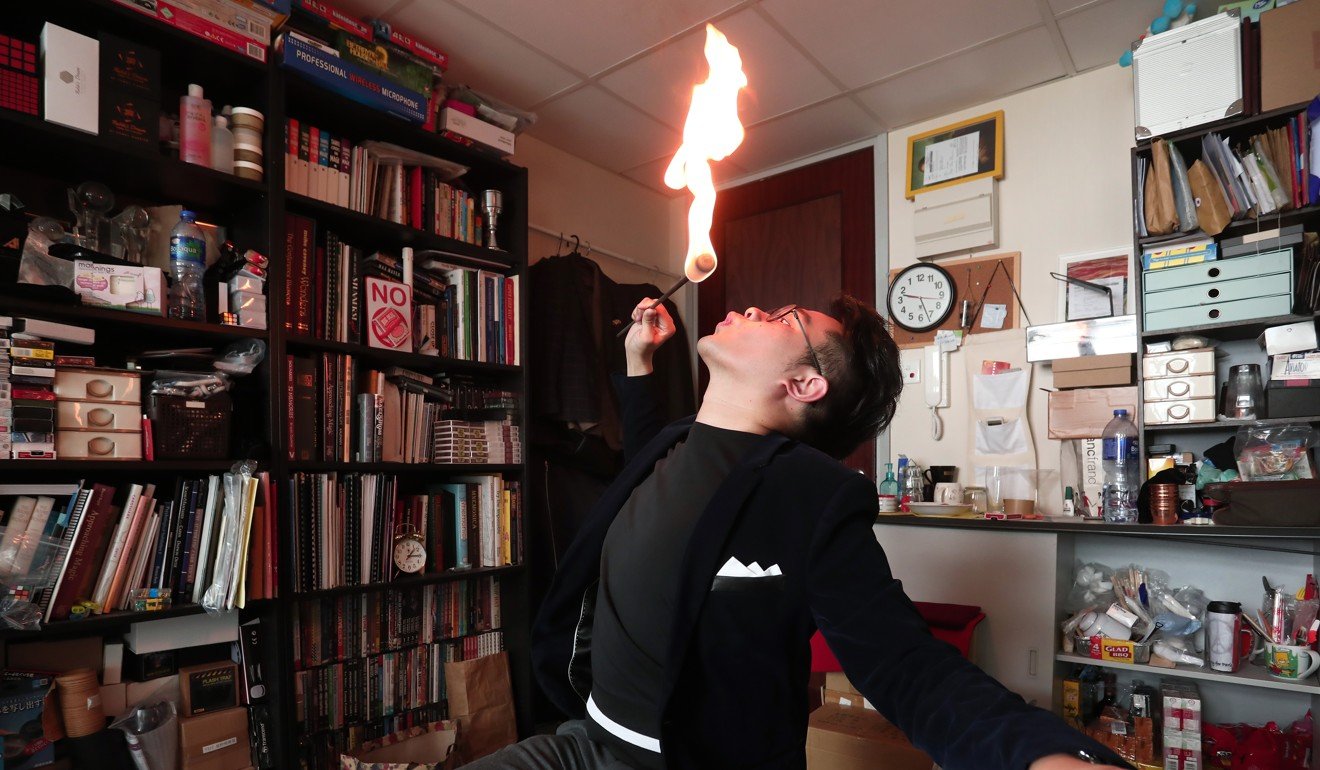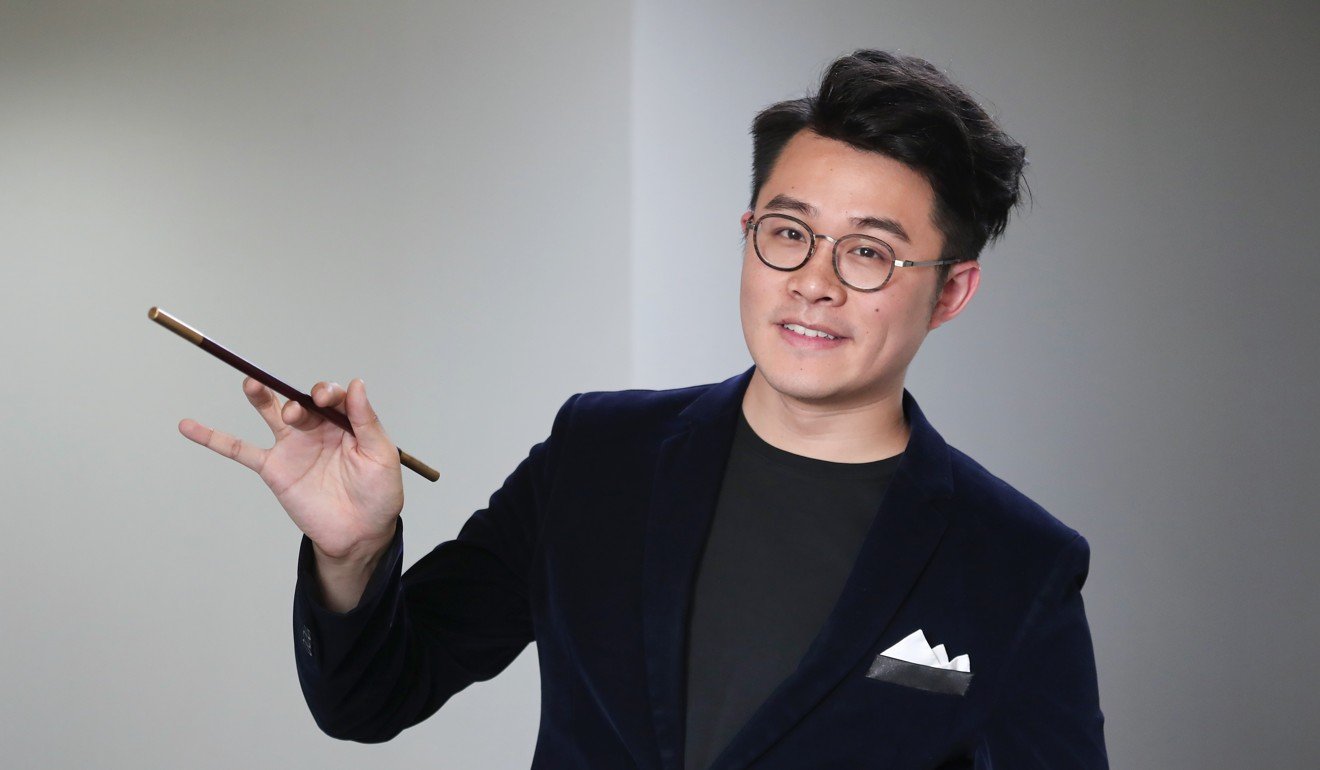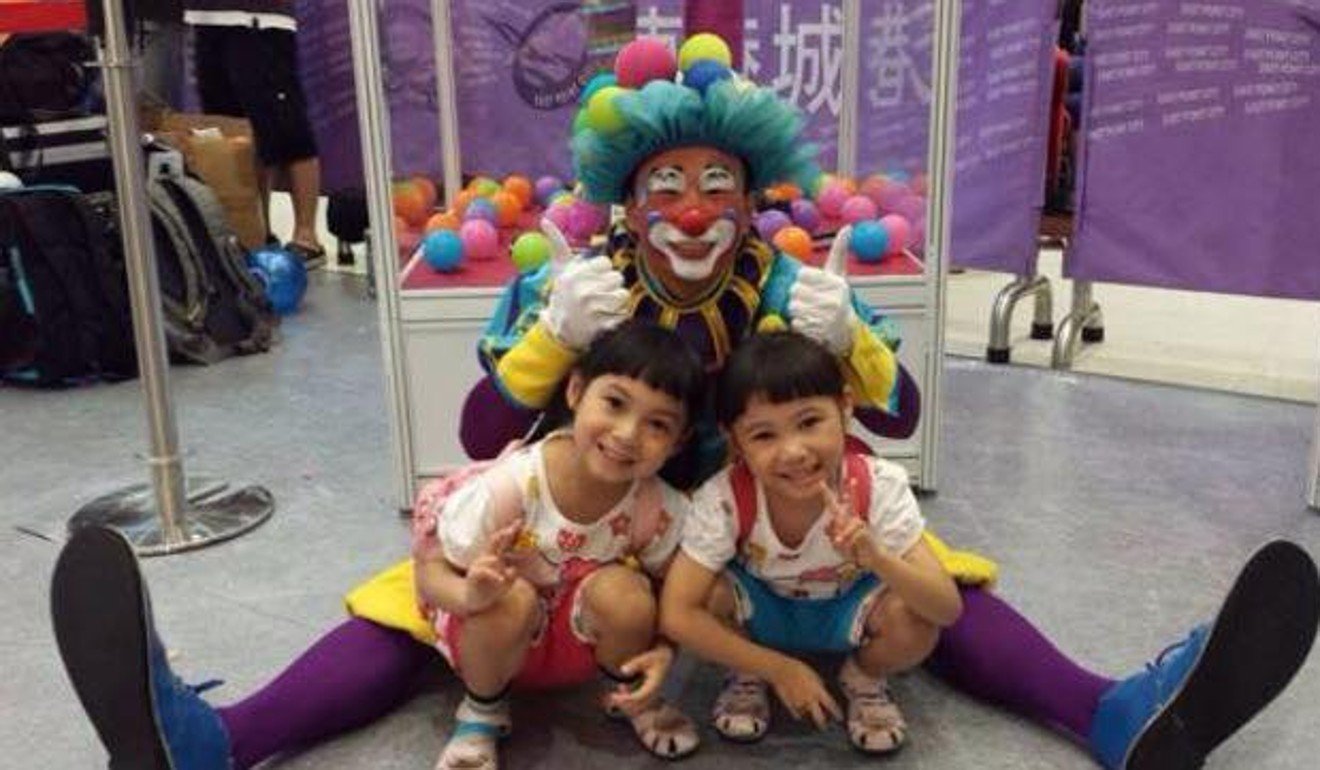
Can Hong Kong’s happy industry spread the cheer in a city notorious for being blue?
‘Don’t worry, be happy’ may be easier said than done, but performers such as magicians and comedians are calling for government support to develop their brand of joy
As a magician whose job is to bring joy to people, Marvin Lam Chun-lok admits he is sometimes not as cheerful as he would like to be, especially when he is on his own.
“I usually take 10 to 30 minutes in the morning, depending on how much free time I have, to meditate,” Lam, 29, says. “This gives me an opportunity to clear my head and genuinely ‘spend’ time with myself.
“Our job is to bring others happiness, and if we don’t feel happy inside, how do we expect to perform well and bring joy to brighten up the lives of other people?”
Perhaps Lam’s blues stem from the fact that like many other Hongkongers, he has no magic trick up his sleeve to get around stress caused by daily issues in real life such as soaring housing costs and inadequacies in the public health care system.
His remarks may strike a chord with most in the city, especially ahead of the annual International Day of Happiness on March 20, designated by the UN. The campaign aims to promote recognition of the importance of happiness regardless of culture or walks of life.
Are Hongkongers really ‘unhappy’, ‘arrogant’ and ‘racist’? Only if you believe what Google tells us
According to a survey last year by US-based research organisation Gallup International, Hong Kong ranked the seventh least happy place in the world – ahead of only Iran, Iraq, Ukraine, Greece, Moldova and Brazil.
The study included interviews with more than 5,000 individuals in 55 countries or cities from last October to December. Respondents were asked if they were happy with their lives, but the study did not look into the reasons behind their levels of satisfaction.
The research suggested Fiji was the happiest place on Earth, followed by Colombia and the Philippines.

In Hong Kong, bread-and-butter issues aside, another reason that cheer is hard to come by may be down to the lack of proper venues and resources for performers to strut their stuff and bring smiles.
Many of Lam’s peers in the entertainment industry complain that their sector is under-represented due to insufficient government support. They say there should be more affordable venues made available for comedy clubs and theatres where they can hone their craft and perform.
His ideas are echoed by local stand-up comedian Vivek Mahbubani, who recommends the government free up more venues, not only for people to perform, but also for audiences to catch a break from their hectic lifestyles, and even participate in the fun.
“In stand-up comedy, we have something called an open-mic night which provides a platform for people to come on stage and try their hand at the craft,” Mahbubani says.
Hongkongers still seem to be a miserable lot, despite their blessings
“It’s also a way for many seasoned comedians to try their new jokes on a real audience. This builds a healthy culture of people going on stage and trying.”
While it may seem like Hong Kong has some catching up to do in the global happiness rankings, residents who tend to look on the bright side of life can sleep easy knowing one thing: the city’s position in the Gallup International survey is actually an improvement from 2016, when in a similar study, it ranked as the second least happy place in the word – just behind Iraq.
Insecurity: the real threat to happiness
For Fernando Cheung Chiu-hung, a Hong Kong Legislative Council member for the New Territories East consistency, medical expenses are the “real threat’ to the happiness of Hongkongers.
“I think one problem is a lack of security,” says Cheung, who is also a registered social worker. “There’s no assurance that if you get sick, your life won’t fall apart from having to bear heavy medical bills.
“And you will have to wait in limbo for a long time before receiving treatment. It’s not a pleasant experience being sick and not knowing when treatment will be available.” Cheung points out that patients who can only afford to go to public hospitals wait months just for a diagnosis.
“Timing is essential because you can lose your life due to late assessments,” he says. “These are the real worries of Hong Kong people.
Cheung says it is not only a problem for the underprivileged but also the middle class, many of whom are not eligible for government relief measures or handouts.
“People can go bankrupt just to stay healthy,” he says.
Building a happy industry
But to local stand up comedian Vivek Mahbubani, every cloud has a silver lining. And it is still his job to make Hongkongers laugh.
“I love the challenge that I have on a daily basis finding the funny aspects of life and how I can tell it to my audience and make them relate and laugh,” Mahbubani, 35, says. “We’re always on the go here, and we may forget to actually enjoy the fruits of our labour which in turn makes us less happy with life.”
To develop the industry, the bilingual comedian says the government can have more venues for people to not only watch shows, but also get involved, such as on open mic nights.
For magician Lam though, who started his career almost two decades ago, it is not as easy being the man behind the smile. He says there is insufficient support from the government to provide programmes and institutions allowing those with talent and abilities to blossom.
“It’s not easy making it as a magician, especially in Hong Kong due to the lack of training,” he says. “I suggest that the government provide more venue support. At the moment, we are having a hard time finding a place to practise and that has become such an obstacle.”
After all, Lam says, he just wants his magic to bring joy, but on a greater scale. “I just want to bring laughter to society, not just at children’s birthday parties.”
No space to chill
A study last year by Hong Kong Polytechnic University’s department of applied social science found that housing problems are making it more difficult for young people to move out of their family homes, and this could lead to conflicts, poor social skills and even mental health issues.
Commissioned by the Hong Kong Family Welfare Society, an NGO, the study included interviews with 1,033 residents aged 15 or above who lived with their families from January to March last year.
The survey showed that on a scale of one to 100, Hong Kong scored 72 points on overall family well-being, lower than the United States’ 85.
Social worker Sze Lai-shan says the problem is even worse within the low-income group.
“It’s caused by the constant and long-term stress of scrambling to make a living, having a financial burden, the lack of social support, as well as discrimination and labelling,” says Lai, a community organiser from the Society for Community Organisation, another NGO.
Sze says some low-income families work around 12 to 15 hours a day but come home to a cramped living environment where they have limited space and little time to rest. And while they toil to make ends meet, they still have to worry about losing their subsidised flats one day if they can no longer afford the increasing rents.
“All they can do is to lower their standard of living to make it through the month with a very limited amount of money,” she says. “How can you expect them to be happy when they are so stressed?”
In a highly pressured city such as Hong Kong, making people happy requires a special talent. Four entertainers explain what makes their work so special.
Vivek Mahbubani, 35, stand-up comedian
“I absolutely love what I’m doing. I get to perform in both English and Cantonese in Hong Kong and also travel around the world making people laugh. I have one trip out of Hong Kong per month on average, so it’s always a fresh feeling for me when I’m on stage for an audience with a different culture. When I come back, I try to use what I learned overseas to improve my skills and show. The challenge so far is that the culture of stand-up comedy in Asia is much younger than in the West. It’s hard to explain to people that what I do doesn’t involve dancing, singing or theatrical tricks.”

Marvin Lam Chun-lok, 29, magician
“What we do is to generate surprises and magic moments. We want people to believe magic is real even though, of course, there are secrets. I get satisfaction in introducing people to magic. When others watch me perform, they have a chance to watch the tricks up close and personal, then they talk about it and feel amazed. I feel that my magic really brings people together. I want my magic to bring people joy. My happiness kind of depends on my clients and I want to bring laughter.”

Lam Man-sze, 25, dancer
“I have performed at Ocean Park and Disneyland during festive seasons in the past. I like my job especially when I see people smile and get excited when watching my performance. I just love to entertain and bring joy
to people.”

Hugo Pang Kin-wai, 33, clown
“I love my job. I like how I can bring joy to different audiences, from children to adults. I enjoy my job so much that I remember on one occasion even after I injured one of my legs while performing I carried on as if nothing had happened. I somehow forgot the pain because I was so focused on the audience who were having such a great time. But there is one thing that upsets me; sometimes people don’t understand how serious we take our job and there are a lot of preparations before we go on stage.”
TOP FIVE HAPPY PLACES
FIJI
About 94 per cent of 515 people surveyed said they were happy with their life, topping the happiness index in a global survey on hope, optimism and happiness.
COLOMBIA
Ranking belies its reputation as a nation steeped in drug crime and violence.
PHILIPPINES
Filipinos are famous for their cheerful character trait. Presidential spokesman Harry Roque was quoted by several local media as saying the ranking was “not surprising as Filipinos manage to smile amid difficulties”.
MEXICO
Despite a wide socioeconomic gap, most Mexicans still feel happy about their life.
VIETNAM
Of the 1,000 people surveyed, merely 1 per cent said they were unhappy, 78 per cent were happy, while the rest were neutral.
TOP FIVE LEAST HAPPY PLACES
IRAN
The second largest economy in the Middle East and North African region ranked as the unhappiest place to live. Half of people surveyed were gloomy about the economy.
IRAQ
Over a third said they were unhappy with life.
UKRAINE
Only 26 per cent of the 500 people polled said they felt joyful.
GREECE
Years of economic recession have taken their toll, with less than half of the 1,002 people polled saying they were happy.
MOLDOVA
Though nearly half of the 1,000 respondents were happy with their lives, this is still one of the poorest countries in Europe.
Source: 2017 global survey on happiness, hope and economic optimism by Gallup International


